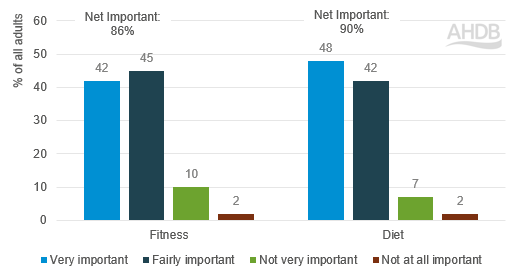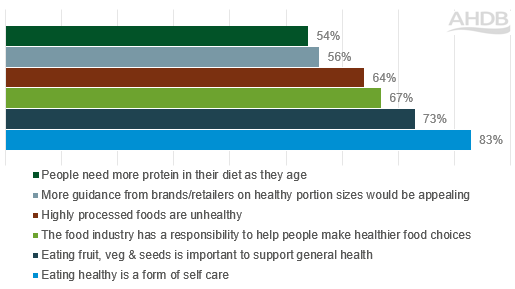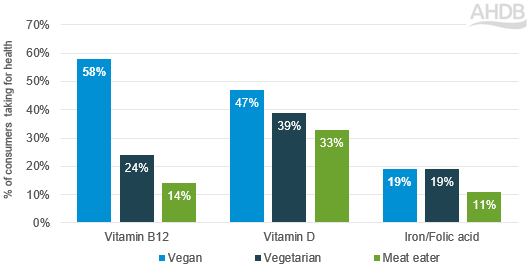Consumer attitudes show health is all about balance
Tuesday, 7 January 2025
From fitness trends to food purchases, consumers increasingly make decisions based on their finances, personal health goals, ethical considerations and sustainability criteria. Among these, attitudes towards diet, fitness and food purchases have become increasingly eminent.
Consumer attitudes on diet and fitness: A move toward holistic health
As pressures around the cost of living ease, the transition toward a more health-conscious population will increase, with a greater focus on both fitness and diet. In the latest YouGov/AHDB Pulse survey, 90% of consumers stated diet was important and 86% said fitness was important, in contributing to their overall health (December 2024). Within this group, 48% regularly exercise three times per week, or more, while 64% confirmed they always or often eat a well-balanced diet highlighting the desire for healthy, nutritious food on a regular basis.
How important do you consider fitness and diet in contributing to your overall health?
Source: YouGov/AHDB Pulse, December 2024
Many consumers are well aware of the recommended health guidelines to eat five portions of fruit and vegetables per day, but according to Kantar Healthy Futures Forum November 2024, there is some confusion around what constitutes a healthy diet. For example:
- As a nation we have eaten 1.3bn fewer servings of fruit and vegetables compared to last year
- 1 bn more meat-free meals were chosen for health, but these are less likely to feature vegetables than meals with meat
- Despite the industry reformulating categories to become healthier, consumers' shopping baskets are getting unhealthier
Barriers to healthy eating
During times of financial strain, cost is a key barrier to healthy eating as consumers prioritise household bills and everyday essentials. As a typical ‘healthy’ meal is more expensive at £2.02, than one with ‘no health’ need at £1.45, consumers need help to choose the healthier option (Kantar Usage, In-home & Carried Out of Home, 52 w/e 1 September 2024).
Many consumers strive to eat healthily, but this is in stark contrast to the state of the nation’s health with around 64% of adults overweight in 2021 (Health Survey for England 2021). Consumers are looking for guidance and believe retailers and manufacturers can incentivise or reward them for choosing the healthier option.
Some 30% of consumers feel it is too time consuming to follow a healthy lifestyle and frequently search for convenience options or quick meals which are less healthy. The average preparation time for an evening meal reduced from 34 minutes in 2021 to 31 minutes in 2024 (Kantar Usage, evening meal, 52 w/e 12 May 2024 vs May 2021), showing consumers have less time to cook, so quick, healthy recipe options with limited ingredients are key.
Aside from cost and time, consumers also state they are confused about what is healthy and that product ingredients are not always clear, leading to confusion when shopping. During times of financial hardship in 2022 and early 2023, insight from Kantar highlighted consumers turned away from health. At the same time, ultra-processed foods (UPF) may offer an attractive option due to the lower price points. Despite some UPFs offering better value, a report from research agency Mintel reported that 64% of consumers think highly processed foods are unhealthy (Attitudes towards Healthy Eating UK, 2024). Today, consumers are demanding more transparency in the labelling of ingredients and naturalness in their food purchases.
Attitudes towards healthy eating (% of respondents that agree)
Source: Kantar Profiles/Mintel, Attitudes towards healthy eating UK, February 2024, 2,000 internet users aged 16+
Where can consumers turn to for advice on healthy eating?
The British Nutrition Foundation and Public Health England both recommend eating a balance of different foods containing key nutrients in your diet as issued in The Eatwell Guide.
The proportions shown below are representative of food consumption over a day or week. This guide recommends six key principles:
- Five a day fruit and vegetables
- Fibre rich foods
- Protein
- Dairy
- Right fats
- Limiting foods high in fat, salt and sugar
Based on our latest survey with YouGov Pulse, vegans and vegetarians are much more likely to be taking vitamin B12, Vitamin D and iron supplements for their health, which are all naturally found in red meat and dairy products.
Which of the following vitamin/mineral supplements do you take for your health?
Source: YouGov/AHDB Pulse, December 2024
Media channels, food packaging and in-store provide opportunities to improve consumer understanding of the ingredients and health benefits of products. For example, AHDB has conducted research to improve understanding of the health benefits of meat by enhancing the labelling of products within stores. The Let’s Eat Balanced marketing campaign also highlights the natural sources of vitamin B12 in beef, lamb and dairy.
Social media has a strong influence among 16-34-year-olds which can often accelerate food trends and influence certain diets. AHDB’s Milk Every Moment campaign creates a positive association between milk consumption and sporting performance within this younger age group.
Consumer health trends in 2025*
- Consumers are most likely to commence a diet at a suitable time throughout the year (36%), rather than in January or the cold winter months (28%), or before their summer holiday (4%)
- 51% of consumers who believe diet and fitness are important, are planning to increase their levels of exercise in 2025. This is highest among the 25-44 age group at 64%
- Consumers who believe diet and fitness are important to their health, are most likely to cut back on consumption of ultra-processed foods (28%), reduce intake of sugar, fat and salt (25%) and consume a more sustainable diet (18%)
- Social media and fitness apps are most likely to influence the 18-34’s to start a new diet or fitness regime in 2025. However the over 55’s are most likely to be motivated by weight loss and/or medical advice
*Data source: YouGov/AHDB Pulse, December 2024.
The future of UK health: A focus on balance and sustainability
Looking ahead, it’s clear that health trends in the UK will continue to evolve, influenced by growing consumer awareness and an increasing demand for healthier, more sustainable choices. The relationship between diet, fitness, and the environment will remain a key driver in shaping consumer behaviours. AHDB’s latest ‘Let’s Eat Balanced’ campaign incorporates these key drivers.
With a desire for more natural and less processed foods, the move towards a flexitarian diet, the balance of plant-based and meat, will continue. However, there will also be a movement towards 'sustainable meat', with some consumers turning to ethically raised and locally sourced. There will also be a strong interest in regenerative farming practices that align with both health and environmental goals.
Similarly, while dairy alternatives are available, traditional dairy will continue to thrive, if the messages around natural goodness, health and ethically sourced are shared. The key challenge for the industry is to provide products that meet the needs of a diverse and informed consumer base while supporting the growing demand for health-conscious and sustainable options.

Sign up to receive the latest information from AHDB.
While AHDB seeks to ensure that the information contained on this webpage is accurate at the time of publication, no warranty is given in respect of the information and data provided. You are responsible for how you use the information. To the maximum extent permitted by law, AHDB accepts no liability for loss, damage or injury howsoever caused or suffered (including that caused by negligence) directly or indirectly in relation to the information or data provided in this publication.
All intellectual property rights in the information and data on this webpage belong to or are licensed by AHDB. You are authorised to use such information for your internal business purposes only and you must not provide this information to any other third parties, including further publication of the information, or for commercial gain in any way whatsoever without the prior written permission of AHDB for each third party disclosure, publication or commercial arrangement. For more information, please see our Terms of Use and Privacy Notice or contact the Director of Corporate Affairs at info@ahdb.org.uk © Agriculture and Horticulture Development Board. All rights reserved.
Topics:
Sectors:
Tags:




